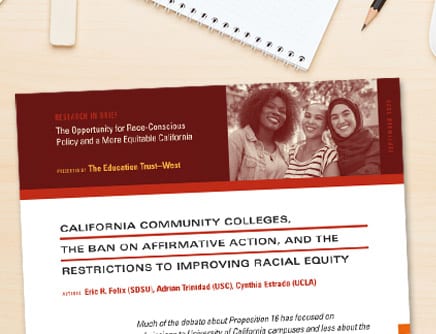Statement in Response to Appointment of New CSU Chancellor
09/23/2020New Poll: Parents of K-12 Students Overwhelmingly Support Prop 15 and Prop 16
10/12/2020The ban on affirmative action adversely impacted the ability of California Community Colleges to tackle persistent inequities facing students of color
OAKLAND, Calif. – A new report from The EdTrust-West found that Proposition (Prop) 209 adversely impacted California’s Community Colleges’ efforts to prioritize racial equity and its 2.1 million students. Implemented in 1996, Prop. 209 banned affirmative action and hampered colleges’ efforts to remedy inequities based on race, retain students, bolster degree completion, and limit race-conscious practice.
“The Opportunity for Race-Conscious Policy and a More Equitable California ,” was published by researchers Eric R. Felix (San Diego State University), Adrián Trinidad (University Southern California) and Cynthia Estrada (University of California, Los Angeles). It is the first of The EdTrust-West’s “Research in Brief” series analyzing education equity issues and perspectives in California.
Proposition 16, which is on the November 2020 ballot, aims to restore affirmative action, provides a new opportunity to improve policies that address structural racism and its detrimental impact on students of color in California’s higher education institutions. Proposition 16 will restore the ability for California Community Colleges to use race- and gender-conscious strategies such as targeted recruitment and retention efforts to build upon and improve campus diversity to ensure equal opportunity for all.
“Race matters. California voters have the opportunity to fight discrimination in California’s Community Colleges by voting in favor of Prop 16,” says Dr. Elisha Smith Arrillaga, Executive Director of The EdTrust-West. “Voters can change history by choosing to give educators and leaders the right tools to address racial and gender inequity. We believe the answer to achieving equity in higher education is to allow for honest conversations about gender, race, racism, and longstanding racial disparities.”
“California’s community colleges are in the midst of a major effort to diversify the ranks of faculty and staff who serve our 2.1 million students,” says Eloy Oakley, Chancellor, California Community Colleges. “For too long, patterns of discrimination and exclusion have resulted in the underrepresentation of people of color on our campuses and hindered our ability to use race-conscious policies to address inequities in hiring and student access and success. Proposition 16 would give us tools to help dismantle structural racism and build a stronger California.”
The high-level findings from the new report illustrate the detrimental effects of restricting the consideration of race within community colleges, including how the 25-year ban on affirmative action (Prop 209)
- Diluted the racial focus of the Student Equity Policy.
- Hindered efforts seeking to remedy inequities based on race in community college.
- Ended race-conscious and culturally relevant programs seeking to improve rates of transfer and completion in community colleges as they could be seen as “not appropriate under the law.”
“Proposition 16 is long overdue. As students, not only do we want to ensure we have equal access to education and see more faculty and staff diversity in the classroom, but we want to know that, as students of color and as women, our diversity will be taken into account when we are the ones applying to jobs after college,” says Katherine Squire, Vice President of the Student Senate for California Community Colleges.
The report identifies several ways to take action between now and Election Day on November 3.
- Institutional leaders can renew their commitment to race-conscious policies
- Community members can expand their awareness of structural racism and how Proposition 16 will create opportunities for California communities.
- Equity advocates can join Yes on Proposition 16 Campaign.
- Policymakers must recognize the need for race-conscious policies to address long-standing inequity.
“Our current social context has elevated the visibility of racial inequities in our health, economy, and educational systems. The twenty-five-year ban on affirmative action has hindered the state’s community college system from enacting race-conscious policies, practices, and decisions that can better support the 2.1 million students it serves,” said Eric R. Felix, PhD, Assistant Professor in the College of Education at San Diego State University. “The report highlights the ways community colleges could benefit from Proposition 16 by lifting constraints on diversifying the professoriate, and allow for policymakers to craft laws that address longstanding racialized barriers to educational equity.”
For more information about “The Opportunity for Race-Conscious Policy and a More Equitable California,” visit this page. To learn more about prioritizing racial equity in California’s education system through Prop 16, visit https://west.edtrust.org/prioritizing-racial-equity/.
About The EdTrust-West
The EdTrust-West works for educational justice and the high academic achievement of all students at all levels, pre-K through college, in the state of California. We expose opportunity and achievement gaps that separate students of color and low-income students from other youth, and we identify and advocate for the strategies that will forever close those gaps.
##


